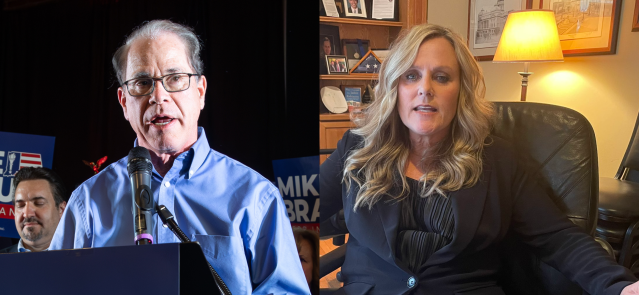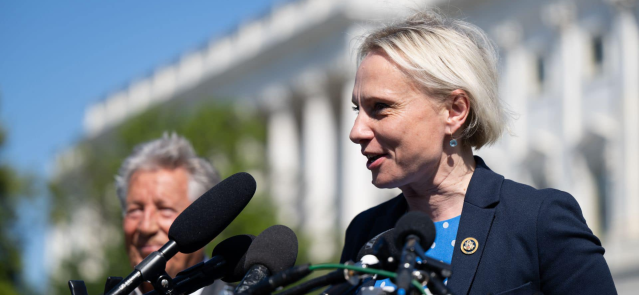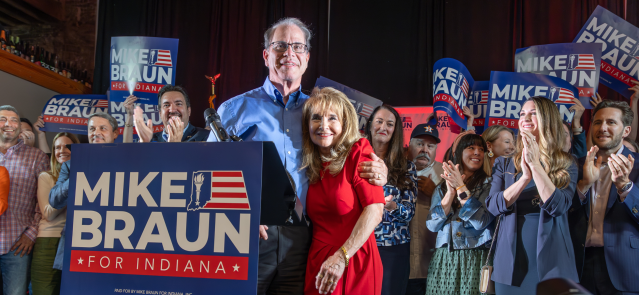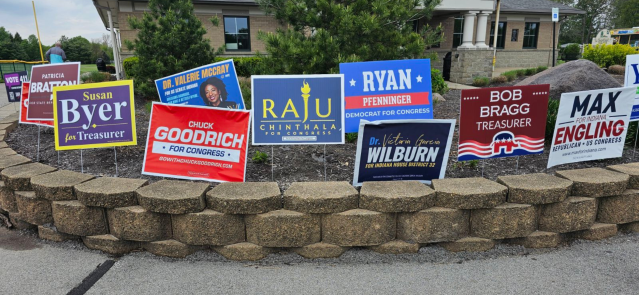Stay ahead of the curve as a political insider with deep policy analysis, daily briefings and policy-shaping tools.
Request a DemoLawmakers OK bill requiring age verification for online porn. Here’s what other states have done.

The Indiana Statehouse January 9, 2024. (Credit: Ronni Moore)
Gist
The Senate approved a bill Thursday by a 44-1 vote, requiring websites featuring pornography to verify someone’s age, in an attempt to prevent minors from accessing adult content.
Indiana’s Senate Bill 17 is part of a wave of legislation across the country targeting the porn industry.
“This is going to go a long way to make sure our kids aren't viewing this content,” said bill author Sen. Mike Bohacek, R-Michiana Shores.
A 2022 Common Sense report found that 73% of respondents ages 13-17, said they have seen online pornography, either accidentally or on purpose.
Here’s how the bill would work and what impact similar legislation has had in other states.
What the bill would do
The bill requires adult-oriented website operators to verify someone is 18 years or older in order to let them access the website. Users would have to provide their ID to access the websites.
Bohacek argued access to adult content should be treated just like other adult-orientated products. Checking a box simply isn’t enough, he said.
“Can you check a box and say you’re 21 when you go to the grocery store to get a beer?” Bohacek asked. “Can you check a box and say I’m over 18 if I want to gamble on one of the gaming sites? Nope.”
Only Senate Democratic Leader Greg Taylor, D-Indianapolis, voted against the bill, due to concerns about what would happen to private information adults shared to verify their age.
“What confidence do any of us have that they will not take our personal information itself?” Taylor said on the Senate floor. “That’s the only thing that’s bad about this bill.”
The House still has to vote on the proposal.
How the proposal has worked in other states
At least eight other states have already passed similar legislation: Arkansas, Louisiana, Mississippi, Montana, North Carolina, Texas, Utah and Virginia.
It started in 2022 with Louisiana, and since then other copycat bills have popped up.
Rather than implement age verification measures, Pornhub — a Canadian-based internet pornography site — has already blocked access to residents in most of those states, like Utah, North Carolina and Montana, restricting access for millions of people. Indiana lawmakers said completely blocking the site isn’t their goal.
But, they wouldn’t be mad about that outcome.
“This isn’t about eliminating pornography from the state of Indiana, although I would be okay with this,” said Sen. Liz Brown, R-Fort Wayne, in committee. “This is not the point.”
Indiana could also face a legal challenge if Senate Bill 17 passes.
In Texas, a similar law requiring adult websites to verify someone’s age is winding its way through the court system. A federal judge ruled in favor of the Free Speech Coalition, the trade association advocating for the adult industry, after it sued Texas over the law. The case is now pending in the U.S. 5th Circuit Court of Appeals.
Chris Daley, executive director of the American Civil Liberties Union of Indiana, warned that Indiana could face a pricey lawsuit by moving forward with Senate Bill 17.
“The state … can limit access to adult material, however, you can’t do that in a way that impermissibly burdens adults,” Daley said. “We can make the internet safer without sacrificing our privacy and constitutional rights.”
Lawmakers weren’t swayed.
“When it’s a good cause, it’s worth spending” to defend possible lawsuits, Brown said.
What do opponents say?
The Free Speech Coalition didn’t testify on the bill, but on its website it emphasizes it is opposed to bills like Senate Bill 17, arguing such bills are ineffective and endanger private information.
Young people, the group said, could just use a virtual private network to get around individual state rules on age. Plus, the group said the sharing of private data provides a “massive opportunity for criminals.”
What’s next?
It’s still early in the legislative process, so this bill is by no means a done deal. The House will have to vote on the proposal before lawmakers leave Indianapolis at the close of the 2024 legislative session in March.
Contact Kaitlin Lange on X @kaitlin_lange or email her at [email protected].
Facebook @stateaffairsin
Instagram @stateaffairsin
LinkedIn @stateaffairs
Read this story for free.
Create AccountRead this story for free
By submitting your information, you agree to the Terms of Service and acknowledge our Privacy Policy.
How McCormick, Braun view abortion, taxes and other key issues
A Democrat-turned-Republican and Republican-turned-Democrat will soon face off in the race to become Indiana’s next governor.
Sen. Mike Braun, who voted as a Democrat prior to 2012, captured the Republican nomination in Tuesday’s primary. Jennifer McCormick, formerly a Republican Superintendent of Public Instruction, will represent the Democrats.
Voters will decide the state’s next chief executive in November.
A State Affairs analysis of the candidates’ campaign platforms and public statements found key differences — and a few similarities — in their planned approaches to a variety of issues impacting Hoosier voters.
Here is how they match up.
Abortion
Braun: As a senator, Braun has long supported abortion restrictions.
In 2020, he called for the Supreme Court to re-examine Roe v. Wade.
In 2023, he proposed federal legislation that would have required parental notification before any unemancipated minor could seek an abortion. He said at the time: “Hoosiers put their trust in me to stand up for the unborn, and that’s what I’ve been proud to do every day in the Senate.”
He has since signaled support for the state’s abortion ban. His platform reads: “State lawmakers must work to ensure the gains we have made to protect life are secured and strengthened.”
McCormick: In a Tuesday interview with State Affairs, McCormick said her candidacy represented a referendum on reproductive rights.
“I’m going to fight to restore those rights under any authority I can, working in a bipartisan fashion, using our committees, board and our agencies. I also know, too, what everybody’s fear is: that they’re [Republicans] not going to restore those rights and will take [restrictions] further.”
From her platform: “Indiana’s Republican-led extreme abortion ban has taken away the right of women to make deeply personal decisions regarding their own health care.”
Marijuana
Braun: At a March 26 Republican primary debate, Braun suggested an openness to legalizing medicinal marijuana.
“It’s gonna hit all of us. I’m gonna listen to law enforcement — they have to put up with the brunt of it,” he said. “Medical marijuana is where I think the case is best made that maybe something needs to change. But I’ll take my cue from law enforcement there as well. … I hear a lot of input where [medical marijuana is] helpful, and I think that you need to listen and see what makes sense.”
McCormick: The Democrat’s platform also addresses medical marijuana legalization, while speculating on possible recreational use.
“We will fight for the legalization of medical marijuana as a source of state revenue established on a well-regulated marketplace and monitored by a Cannabis Task Force in order to study the issues, opportunities and potential obstructions associated with recreational marijuana legalization.”
McCormick said she would also support expunging low-level marijuana-related convictions.
Taxes
Braun: At a March 19 National Federation of Independent Business forum, Braun said the state’s property tax system “went out of whack because it couldn’t respond to inflation like we’ve never seen before.”
“The way you finance any lower taxes would be to bank on the government being run more efficiently,” he said.
His platform also calls for government spending cuts to finance lower taxes: “Reducing the size of government is the key to cutting taxes, and Mike Braun will work through every state agency to find ways to save money while delivering high-quality services to taxpayers.”
McCormick: McCormick also spoke about taxes at the March 19 forum.
“I agree with a revamp of our taxing system,” she said. “But also it’s about not just how we’re getting our revenue, it’s about our expenditures. Yes, we need to fix our gas tax. Yes, we need to look at the income tax. But here’s the thing: There are hidden taxes we’re not having a conversation about.”
Her platform also references the possibility of combining state agencies as a way to save money.
Education
Braun: In his platform, Braun supports broadening school choice and parental rights.
“As a former school board member, Mike Braun knows parents are the primary stakeholders in their children’s education and every family, regardless of income or zip code, should be able to enroll in a school of their choice and pursue a curriculum that prepares them for a career, college or the military,” the platform reads.
Braun also pledged to ensure critical race theory and discussions about gender are banned in public schools.
McCormick: Education is one of McCormick’s primary issues, according to her platform.
She calls for the elimination of statewide testing, increased early childhood reading and child care options and a minimum base salary of $60,000 for all K-12 teachers.
McCormick also addresses the state’s school choice movement.
“We will call for a pause in the expansion of school privatization efforts while requiring fiscal and academic accountability and transparency for all of Indiana schools that receive public tax dollars,” her platform reads.
U.S.-Mexico border
Braun: Braun’s television ads have touched on border security, and his platform calls for increased focus on the area.
“Joe Biden and the left have created a humanitarian and national security crisis on our southern border,” the platform reads. “As governor, Mike will continue to support and enact the America First policies that were working. Otherwise, every town will become a border town.”
McCormick: McCormick’s border-related plans are more focused on facilitating legal immigration.
“We will work with local, state and federal officials in supporting an immigrant system that creates a safe, timely, orderly and humane pathway for those seeking legal immigration while keeping our communities and those responsible for border security safe,” her platform reads.
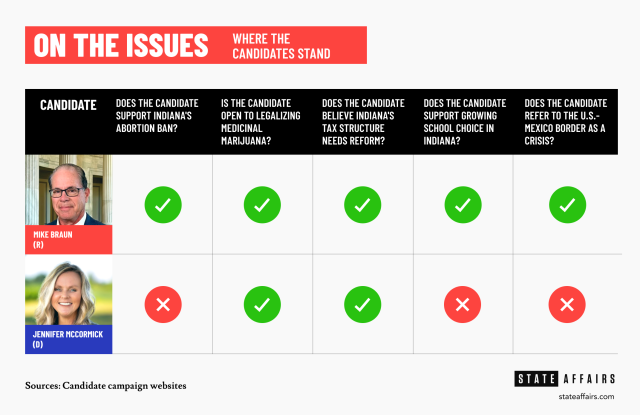
Contact Rory Appleton on X at @roryehappleton or email him at [email protected].
Spartz, Shreve, Stutzman win Republican congressional primaries
A central Indiana congresswoman successfully fought off eight primary challengers, while crowded races for three other Republican-leaning congressional districts began to clear in Tuesday’s primary election. And in northeastern Indiana, a former congressman held on in a tight race as he seeks to return to Congress. All of the state’s nine U.S. House of Representatives …
Mike Braun wins the Indiana Republican nomination for governor
U.S. Sen. Mike Braun was declared the winner of the Republican gubernatorial nomination shortly after polls in Indiana’s Central Time Zone closed. With 98% of votes counted as of Wednesday morning, Braun had 39.6%, followed by Lt. Gov. Suzanne Crouch with 21.8%, Brad Chambers with 17.5%, Eric Doden with 11.9 %, Jamie Reitenour with 4.8% …
Here’s how to vote in Indiana’s primary election
Thousands of Hoosier voters will head to the polls Tuesday, May 7, for Indiana’s primary election. This year’s ballot includes a competitive contest for governor, as well as dozens of state and federal legislative races and a few school referenda. The primary will decide which candidates will represent their respective parties in the Nov. 5 …

